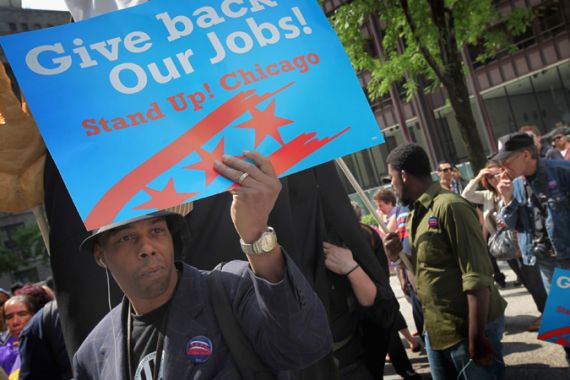US job creation accelerates slightly
Better-than-expected labour data signal lower unemployment amid fears of a “second recession”.

| Al Jazeera’s Patty Culhane reports from Elkhart, Indiana, where there is more evidence the US economy is in a rut |
The US labour department has released the unemployment and job creation figures for the month of July, revealing higher-than-expected job-creation rates and giving hopes that the economy has not stalled.
The announcement on Friday said that 117,000 jobs were created this month, lowering the unemployment rate from 9.2 to 9.1 per cent.
Keep reading
list of 4 itemsWhy are nations racing to buy weapons?
Parallel economy: How Russia is defying the West’s boycott
US House approves aid package worth billions for Ukraine, Israel
Economists predict at least 125,000 jobs are needed to accommodate new entrants to the work force in order to keep up with the growing population, and 250,000 jobs are needed bring about a significant decline in the unemployment rate.
The economy needs to expand at an annual rate of at least 2.5 per cent to keep the unemployment rate from rising.
The labour department report also revised upward the data for the previous two months, which had originally raised concerns that the economy had flat-lined.
“What the numbers actually reflect is that the economy is adding jobs, but it’s not adding enough jobs,” Al Jazeera’s Patty Culhane reported from Ekhart, Indiana, on Friday.
“It doesn’t seem to these people in Indiana that it has gotten any better … What they know here is that they’re mad. They’re frustrated.
“People in Indiana are angrier than I’ve ever seen them with Washington DC.”
Offsetting job loss
The better-than-expected numbers came after markets worldwide fell sharply on worries that the data would show the US economy headed into stagnation.
The private sector generated 154,000 jobs in July, offsetting a loss of 37,000 positions in the public sector, many of which came from sweeping layoffs in the state of Minnesota as the government shut down due to a political fight over spending and union benefits.
|
Al Jazeera’s Rob Reynolds reports from Texas where jobs offer low pay and fewer benefits amid 8.2% unemployment |
On average, economists had forecast only a net 84,000 jobs generated.
“Job gains occurred in health care, retail trade, manufacturing and mining,” the labour department said.
“The decline was almost entirely due to the partial government shutdown in Minnesota.”
The labour department revised the figures for June to 46,000 net jobs [from the original 25,000 estimate] and for May, 53,000 [from 18,000].
Though better than before, the three-month average remains well below the amount needed to accommodate new entrants to the workforce, and that is besides a cut to the overall official number of 14.1m US citizens without jobs.
The US stock market also opened better than expected on Friday, which has largely been attributed to the labour department’s job report.
Long way to go
But the economy still has a long way to go to recover its losses over the past two and a half years.
The US stock market closed on Friday after a shaky day, where the market opened positively, but bounced back and forth, closing not far from where it had started.
The major Dow Jones closed up 0.5 per cent, Standard & Poor closed down 0.1 per cent, and Nasdaq closed down 0.9 per cent.
That came after Thursday’s close in which the Dow lost 513 points – its biggest loss since 2008.
“Clearly, the country and the markets are still nervous and still a little uncertain,” Al Jazeera’s Kristin Saloomey reported from Wall Street in New York City.
“The jobs that were lost in the first recession have not been recovered … but things are a little more positive here on Wall Street.”
Earlier in the day, European markets fell on deepening fears about a debt crisis in the European Union and concerns about US economic growth.
London’s FTSE-100, Paris’ CAC-40 and Frankfurt’s DAX indices all opened down over three per cent on Friday.
After the sharp initial drop, all three indices had recovered slightly by 1200GMT, with the British FTSE-100 at 5,282 points, the German DAX at 6,300 and the French CAC at 3,309.
Earlier, Asian markets also fell steeply, after heavy losses in European trading through the day on Thursday.